Linux系列之学会使用CURL命令
2021-01-19 21:14
YPE html>
标签:remote bsp include engine 命令 within ESS 文件操作 update
@
- 一. 查看帮助
- 1.1 查看命令参数
- 1.2 查看详细使用
- 二. 提取网页
- 2.1 查看网页源码
- 2.2 显示头信息
- 2.3 显示通信过程
- 2.4 查看议定书
- 2.5 查看时间
- 三. 用curl进行认证
- 3.1 referer设置
- 4.2 用户代理设置
- 4.3 用户信息校验
- 五. 文件操作
- 5.1 保存文件
- 5.2 文件下载
- 5.3 上传文件
- 六. Cookie设置
- 6.1 设置cookie
- 6.2 cookie -b -c
- 6.3 指定cookie文件
- 七. curl RESTFul
- 7.1 RESTFul API
- 7.2 POST请求
- 7.3 GET请求
- 7.4 DELETE请求
- 7.5 PUT请求
- 八. CURL参考资料
curl命令是一个利用URL规则在shell终端命令行下工作的文件传输工具;curl命令作为一款强力工具,curl支持包括HTTP、HTTPS、ftp等众多协议,还支持POST、cookies、认证、从指定偏移处下载部分文件、用户代理字符串、限速、文件大小、进度条等特征;做网页处理流程和数据检索自动化。
语法:语法格式:curl [参数] [网址]

一. 查看帮助
1.1 查看命令参数
curl的参数很多,可以用命令curl --help查看:
[root@localhost ~]# curl --help
Usage: curl [options...]
Options: (H) means HTTP/HTTPS only, (F) means FTP only
--anyauth Pick "any" authentication method (H)
-a, --append Append to target file when uploading (F/SFTP)
--basic Use HTTP Basic Authentication (H)
--cacert FILE CA certificate to verify peer against (SSL)
--capath DIR CA directory to verify peer against (SSL)
-E, --cert CERT[:PASSWD] Client certificate file and password (SSL)
--cert-type TYPE Certificate file type (DER/PEM/ENG) (SSL)
--ciphers LIST SSL ciphers to use (SSL)
--compressed Request compressed response (using deflate or gzip)
-K, --config FILE Specify which config file to read
--connect-timeout SECONDS Maximum time allowed for connection
-C, --continue-at OFFSET Resumed transfer offset
-b, --cookie STRING/FILE String or file to read cookies from (H)
-c, --cookie-jar FILE Write cookies to this file after operation (H)
--create-dirs Create necessary local directory hierarchy
--crlf Convert LF to CRLF in upload
--crlfile FILE Get a CRL list in PEM format from the given file
-d, --data DATA HTTP POST data (H)
--data-ascii DATA HTTP POST ASCII data (H)
--data-binary DATA HTTP POST binary data (H)
--data-urlencode DATA HTTP POST data url encoded (H)
--delegation STRING GSS-API delegation permission
--digest Use HTTP Digest Authentication (H)
--disable-eprt Inhibit using EPRT or LPRT (F)
--disable-epsv Inhibit using EPSV (F)
-D, --dump-header FILE Write the headers to this file
--egd-file FILE EGD socket path for random data (SSL)
--engine ENGINGE Crypto engine (SSL). "--engine list" for list
-f, --fail Fail silently (no output at all) on HTTP errors (H)
-F, --form CONTENT Specify HTTP multipart POST data (H)
--form-string STRING Specify HTTP multipart POST data (H)
--ftp-account DATA Account data string (F)
--ftp-alternative-to-user COMMAND String to replace "USER [name]" (F)
--ftp-create-dirs Create the remote dirs if not present (F)
--ftp-method [MULTICWD/NOCWD/SINGLECWD] Control CWD usage (F)
--ftp-pasv Use PASV/EPSV instead of PORT (F)
-P, --ftp-port ADR Use PORT with given address instead of PASV (F)
--ftp-skip-pasv-ip Skip the IP address for PASV (F)
--ftp-pret Send PRET before PASV (for drftpd) (F)
--ftp-ssl-ccc Send CCC after authenticating (F)
--ftp-ssl-ccc-mode ACTIVE/PASSIVE Set CCC mode (F)
--ftp-ssl-control Require SSL/TLS for ftp login, clear for transfer (F)
-G, --get Send the -d data with a HTTP GET (H)
-g, --globoff Disable URL sequences and ranges using {} and []
-H, --header LINE Custom header to pass to server (H)
-I, --head Show document info only
-h, --help This help text
--hostpubmd5 MD5 Hex encoded MD5 string of the host public key. (SSH)
-0, --http1.0 Use HTTP 1.0 (H)
--ignore-content-length Ignore the HTTP Content-Length header
-i, --include Include protocol headers in the output (H/F)
-k, --insecure Allow connections to SSL sites without certs (H)
--interface INTERFACE Specify network interface/address to use
-4, --ipv4 Resolve name to IPv4 address
-6, --ipv6 Resolve name to IPv6 address
-j, --junk-session-cookies Ignore session cookies read from file (H)
--keepalive-time SECONDS Interval between keepalive probes
--key KEY Private key file name (SSL/SSH)
--key-type TYPE Private key file type (DER/PEM/ENG) (SSL)
--krb LEVEL Enable Kerberos with specified security level (F)
--libcurl FILE Dump libcurl equivalent code of this command line
--limit-rate RATE Limit transfer speed to this rate
-l, --list-only List only names of an FTP directory (F)
--local-port RANGE Force use of these local port numbers
-L, --location Follow redirects (H)
--location-trusted like --location and send auth to other hosts (H)
-M, --manual Display the full manual
--mail-from FROM Mail from this address
--mail-rcpt TO Mail to this receiver(s)
--mail-auth AUTH Originator address of the original email
--max-filesize BYTES Maximum file size to download (H/F)
--max-redirs NUM Maximum number of redirects allowed (H)
-m, --max-time SECONDS Maximum time allowed for the transfer
--metalink Process given URLs as metalink XML file
--negotiate Use HTTP Negotiate Authentication (H)
-n, --netrc Must read .netrc for user name and password
--netrc-optional Use either .netrc or URL; overrides -n
--netrc-file FILE Set up the netrc filename to use
-N, --no-buffer Disable buffering of the output stream
--no-keepalive Disable keepalive use on the connection
--no-sessionid Disable SSL session-ID reusing (SSL)
--noproxy List of hosts which do not use proxy
--ntlm Use HTTP NTLM authentication (H)
-o, --output FILE Write output to instead of stdout
--pass PASS Pass phrase for the private key (SSL/SSH)
--post301 Do not switch to GET after following a 301 redirect (H)
--post302 Do not switch to GET after following a 302 redirect (H)
--post303 Do not switch to GET after following a 303 redirect (H)
-#, --progress-bar Display transfer progress as a progress bar
--proto PROTOCOLS Enable/disable specified protocols
--proto-redir PROTOCOLS Enable/disable specified protocols on redirect
-x, --proxy [PROTOCOL://]HOST[:PORT] Use proxy on given port
--proxy-anyauth Pick "any" proxy authentication method (H)
--proxy-basic Use Basic authentication on the proxy (H)
--proxy-digest Use Digest authentication on the proxy (H)
--proxy-negotiate Use Negotiate authentication on the proxy (H)
--proxy-ntlm Use NTLM authentication on the proxy (H)
-U, --proxy-user USER[:PASSWORD] Proxy user and password
--proxy1.0 HOST[:PORT] Use HTTP/1.0 proxy on given port
-p, --proxytunnel Operate through a HTTP proxy tunnel (using CONNECT)
--pubkey KEY Public key file name (SSH)
-Q, --quote CMD Send command(s) to server before transfer (F/SFTP)
--random-file FILE File for reading random data from (SSL)
-r, --range RANGE Retrieve only the bytes within a range
--raw Do HTTP "raw", without any transfer decoding (H)
-e, --referer Referer URL (H)
-J, --remote-header-name Use the header-provided filename (H)
-O, --remote-name Write output to a file named as the remote file
--remote-name-all Use the remote file name for all URLs
-R, --remote-time Set the remote file‘s time on the local output
-X, --request COMMAND Specify request command to use
--resolve HOST:PORT:ADDRESS Force resolve of HOST:PORT to ADDRESS
--retry NUM Retry request NUM times if transient problems occur
--retry-delay SECONDS When retrying, wait this many seconds between each
--retry-max-time SECONDS Retry only within this period
-S, --show-error Show error. With -s, make curl show errors when they occur
-s, --silent Silent mode. Don‘t output anything
--socks4 HOST[:PORT] SOCKS4 proxy on given host + port
--socks4a HOST[:PORT] SOCKS4a proxy on given host + port
--socks5 HOST[:PORT] SOCKS5 proxy on given host + port
--socks5-hostname HOST[:PORT] SOCKS5 proxy, pass host name to proxy
--socks5-gssapi-service NAME SOCKS5 proxy service name for gssapi
--socks5-gssapi-nec Compatibility with NEC SOCKS5 server
-Y, --speed-limit RATE Stop transfers below speed-limit for ‘speed-time‘ secs
-y, --speed-time SECONDS Time for trig speed-limit abort. Defaults to 30
--ssl Try SSL/TLS (FTP, IMAP, POP3, SMTP)
--ssl-reqd Require SSL/TLS (FTP, IMAP, POP3, SMTP)
-2, --sslv2 Use SSLv2 (SSL)
-3, --sslv3 Use SSLv3 (SSL)
--ssl-allow-beast Allow security flaw to improve interop (SSL)
--stderr FILE Where to redirect stderr. - means stdout
--tcp-nodelay Use the TCP_NODELAY option
-t, --telnet-option OPT=VAL Set telnet option
--tftp-blksize VALUE Set TFTP BLKSIZE option (must be >512)
-z, --time-cond TIME Transfer based on a time condition
-1, --tlsv1 Use => TLSv1 (SSL)
--tlsv1.0 Use TLSv1.0 (SSL)
--tlsv1.1 Use TLSv1.1 (SSL)
--tlsv1.2 Use TLSv1.2 (SSL)
--trace FILE Write a debug trace to the given file
--trace-ascii FILE Like --trace but without the hex output
--trace-time Add time stamps to trace/verbose output
--tr-encoding Request compressed transfer encoding (H)
-T, --upload-file FILE Transfer FILE to destination
--url URL URL to work with
-B, --use-ascii Use ASCII/text transfer
-u, --user USER[:PASSWORD] Server user and password
--tlsuser USER TLS username
--tlspassword STRING TLS password
--tlsauthtype STRING TLS authentication type (default SRP)
-A, --user-agent STRING User-Agent to send to server (H)
-v, --verbose Make the operation more talkative
-V, --version Show version number and quit
-w, --write-out FORMAT What to output after completion
--xattr Store metadata in extended file attributes
-q If used as the first parameter disables .curlrc
国内翻译过来的curl文档:curl参数介绍
1.2 查看详细使用
也可以使用curl --manual查看基本用法例子: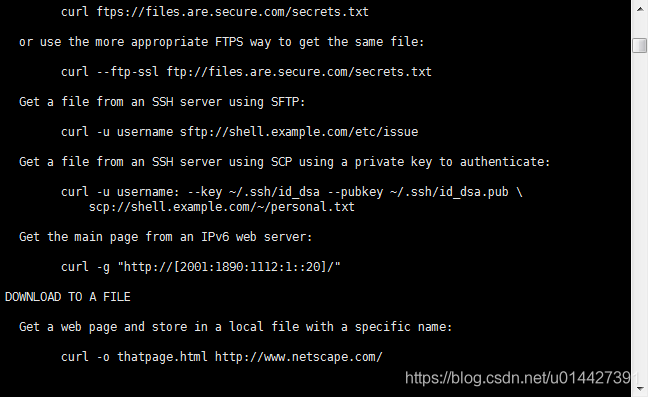
二. 提取网页
2.1 查看网页源码
语法:curl uri
[root@localhost ~]# curl www.baidu.com
百度一下,你就知道
 新闻 hao123 地图 视频 贴吧 更多产品
新闻 hao123 地图 视频 贴吧 更多产品 关于百度 About Baidu
©2017 Baidu 使用百度前必读 意见反馈 京ICP证030173号 
2.2 显示头信息
curl -i https://www.baidu.com
打印信息:
[root@localhost ~]# curl -i https://www.baiud.com
curl: (7) Failed connect to www.baiud.com:443; Connection refused
[root@localhost ~]# curl -i https://www.baidu.com
HTTP/1.1 200 OK
Accept-Ranges: bytes
Cache-Control: private, no-cache, no-store, proxy-revalidate, no-transform
Connection: keep-alive
Content-Length: 2443
Content-Type: text/html
Date: Mon, 13 Jul 2020 07:22:02 GMT
Etag: "588603eb-98b"
Last-Modified: Mon, 23 Jan 2017 13:23:55 GMT
Pragma: no-cache
Server: bfe/1.0.8.18
Set-Cookie: BDORZ=27315; max-age=86400; domain=.baidu.com; path=/
...
2.3 显示通信过程
curl -v www.baidu.com
curl -v www.baidu.com
* About to connect() to www.baidu.com port 80 (#0)
* Trying 182.61.200.7...
* Connected to www.baidu.com (182.61.200.7) port 80 (#0)
> GET / HTTP/1.1
> User-Agent: curl/7.29.0
> Host: www.baidu.com
> Accept: */*
>
...
2.4 查看议定书
[root@localhost ~]# curl --trace-ascii output.txt https://www.baidu.com
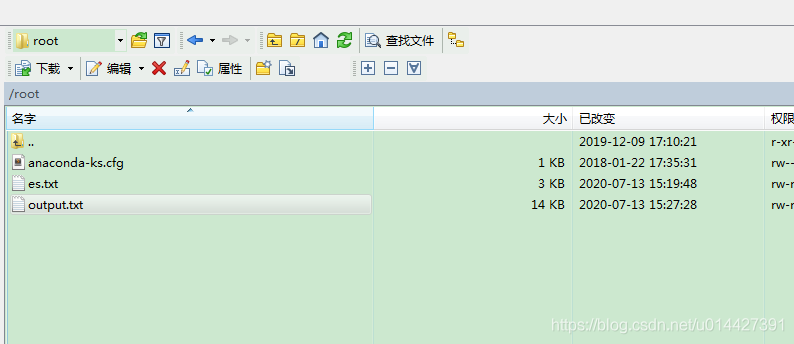
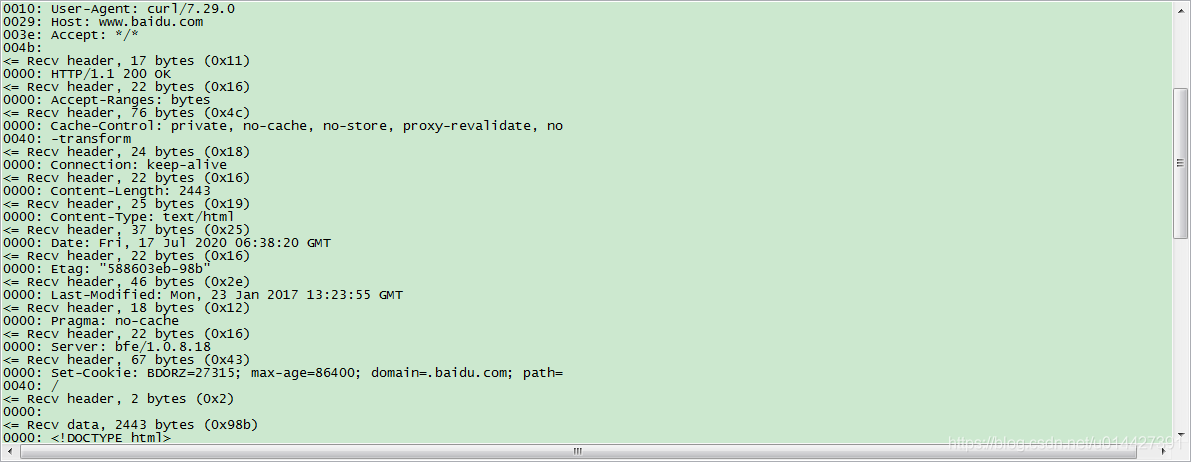
2.5 查看时间
curl --trace-ascii output.txt --trace-time https://www.baidu.com
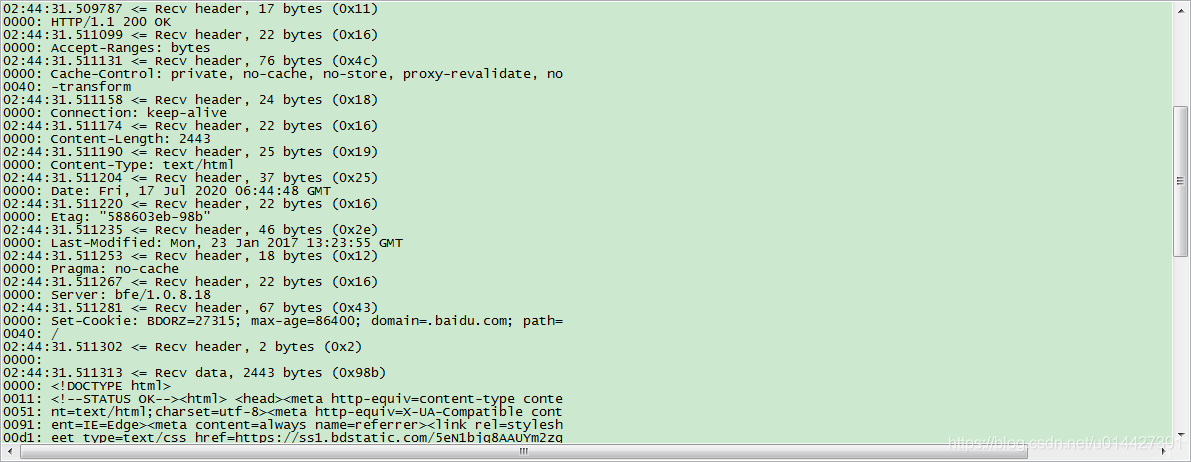
三. 用curl进行认证
3.1 referer设置
referer参数描述了一个网页的来源,可以按F12调试模式,查看: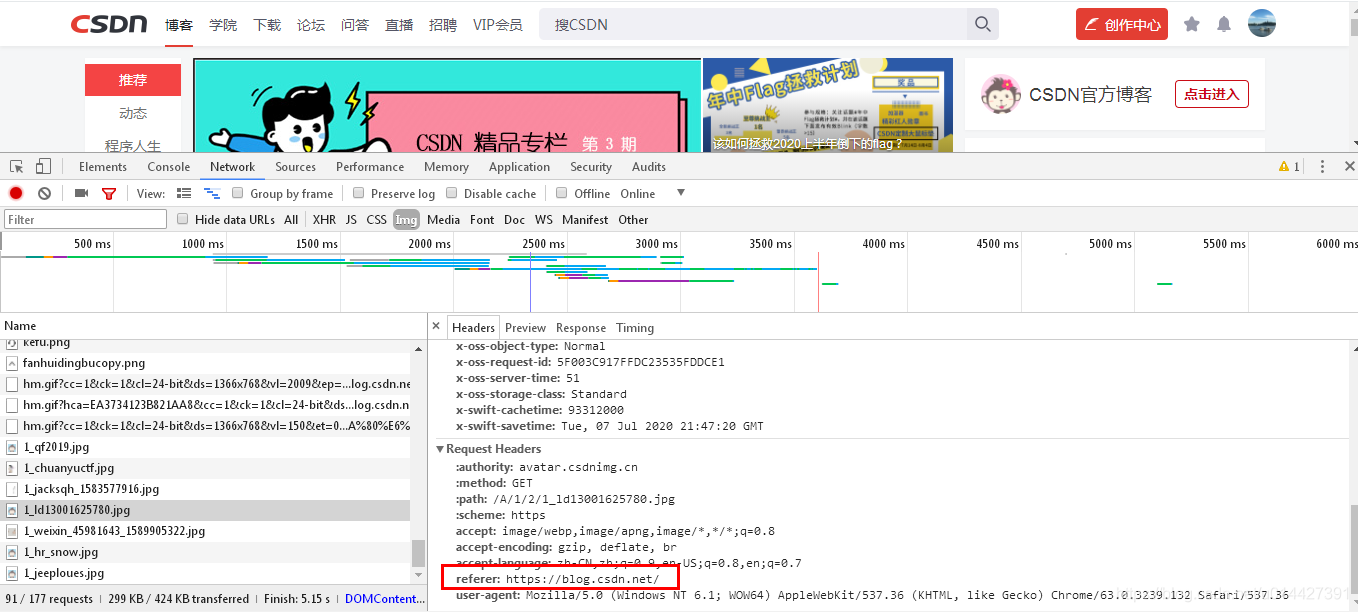
访问百度时候,加上referer为csdn:
[root@localhost ~]# curl --referer https://blog.csdn.net https://www.baidu.com
4.2 用户代理设置
用户代理常被用于兼容ie,有时,您会看到获取带有curl的页面不会返回与使用浏览器获取页面时看到的页面相同的页面,这时候可以设置用户代理:
curl www.baidu.com --user-agent "Mozilla/5.0"
curl www.baidu.com -A "Mozilla/5.0"
4.3 用户信息校验
比如登录百度,可以用-u参数,接着会提示输入密码
[root@localhost ~]# curl -u admin https://www.baidu.net/
Enter host password for user ‘admin‘:
五. 文件操作
5.1 保存文件
语法:curl -o filename uri
[root@localhost ~]# curl -o baidu.html www.baidu.com
% Total % Received % Xferd Average Speed Time Time Time Current
Dload Upload Total Spent Left Speed
100 2381 100 2381 0 0 22761 0 --:--:-- --:--:-- --:--:-- 22894

5.2 文件下载
语法:curl uri filename --silent|progress
- --silent:不显示进度条
- --progress:显示进度条
[root@localhost ~]# curl https://avatar.csdnimg.cn/3/5/E/1_meituantech_1564971608.jpg -omeituan.jpg --progress
######################################################################## 100.0%

5.3 上传文件
语法: $ curl --form upload=@localfilename --form press=OK [URL]
[root@localhost ~]# curl --form upload=@baidu.html --form press=OK url
六. Cookie设置
6.1 设置cookie
设置cookie,可以用命令--cookie
6.2 cookie -b -c
-c cookie-file可以保存服务器返回的cookie到文件,-b cookie-file可以使用这个文件作为cookie信息,进行后续的请求。
$ curl -c cookies http://example.com
$ curl -b cookies http://example.com
[root@localhost ~]# curl -c "name=cookiename" www.baidu.com
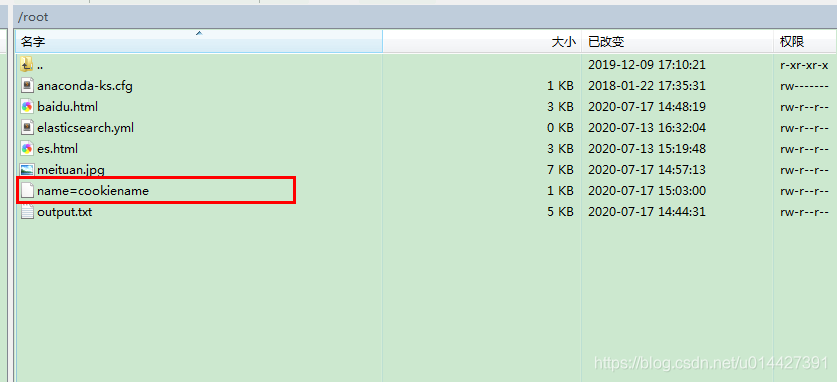
6.3 指定cookie文件
也可以用--cookie-jar指定cookie文件
[root@localhost ~]# curl www.baidu.com --cookie-jar cookie_file
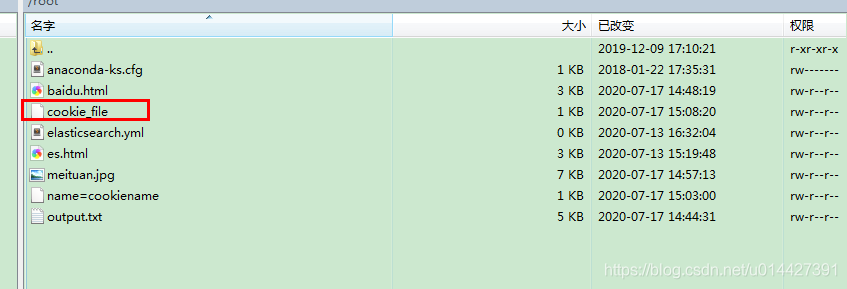
指定可下载的最大文件大小,可以用命令--limit-rate
[root@localhost ~]# curl www.baidu.com --limit-rate 50k
七. curl RESTFul
7.1 RESTFul API
curl支持RESTFul API格式的,所以先补充一些RESTFul API知识:
-
GET 请求:获取服务器中的对象
- 相当于SQL的Select命令
- GET /blogs:列出所有博客信息
-
POST 请求:在服务器上新增对象
- 相当于SQL的Update命令
- POST /blogs/ID:新增指定的博客信息
-
PUT 请求:在服务器上更新对象
- 相当于SQL的Create命令
- PUT /blogs/ID:更新一个博客信息
-
DELETE 请求:删除服务器中的对象
- 相当于SQL的Delete命令
- DELETE /blogs/ID:删除指定的博客
-
HEAD 请求:仅仅用于获取对象的基础信息
7.2 POST请求
ps:-H指定请求header,-d指定参数
- CURL POST:
[root@localhost ~]# curl -H "Content-Type:application/json" -X POST localhost:9200/company/employees/1 -d ‘{"id" :1,"name":"admin","password":"123"}‘
7.3 GET请求
- CURL GET:
[root@localhost ~]# curl -X GET localhost:9200/company/employees/1?pretty=true
7.4 DELETE请求
- CURL DELETE:
[root@localhost ~]# curl -X DELETE localhost:9200/company/employees/1
7.5 PUT请求
- CURL PUT:
curl -H "Content-Type:application/json" -X PUT localhost:9200/company/employees/1 -d ‘{"id" :1,"name":"admin","password":"111"}‘
curl默认是GET方式请求url的,要调POST等接口,必须加上-X参数指定
八. CURL参考资料
CURL 官网教程:https://curl.haxx.se/docs/httpscripting.html
阮一峰老师教程:http://www.ruanyifeng.com/blog/2011/09/curl.html
Linux系列之学会使用CURL命令
标签:remote bsp include engine 命令 within ESS 文件操作 update
原文地址:https://www.cnblogs.com/mzq123/p/13331457.html
上一篇:学习CSS3 圆角总结
下一篇:ASP.Net Core 3.1 With Autofac ConfigureServices returning an System.IServiceProvider isn't s
文章标题:Linux系列之学会使用CURL命令
文章链接:http://soscw.com/index.php/essay/44237.html